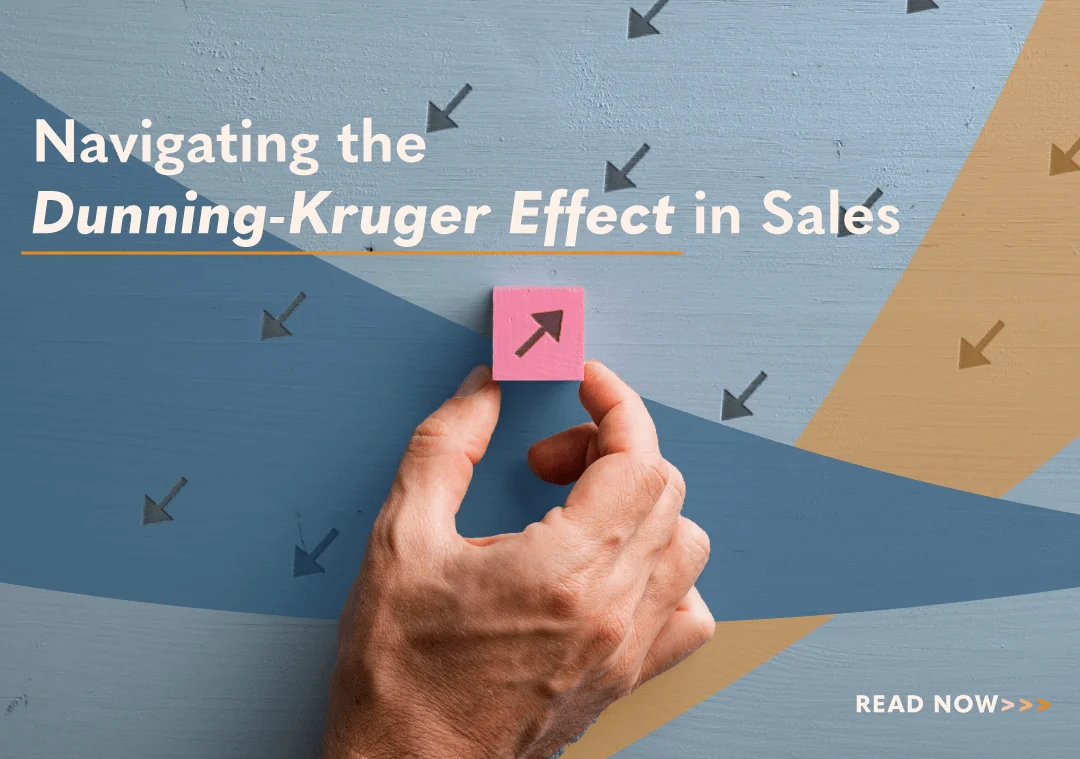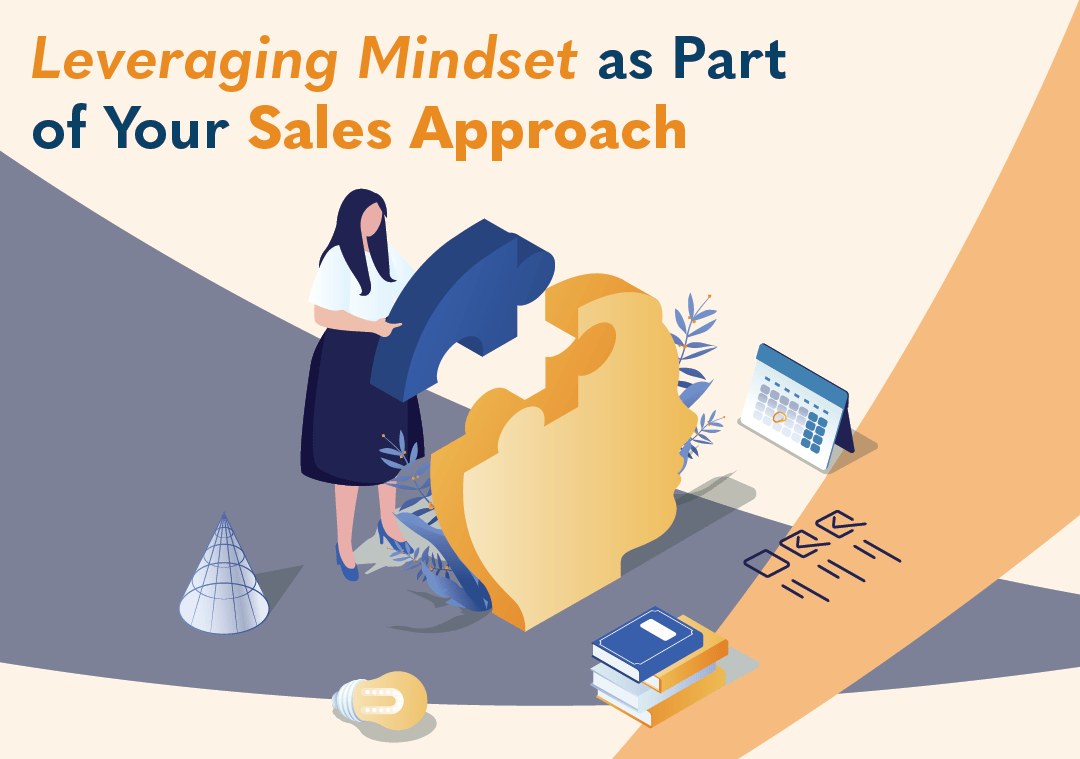Navigating the Dunning-Kruger Effect in Sales

The Dunning-Kruger Effect is a cognitive bias in which people with less skill, experience, or expertise overestimate their ability and knowledge. It was first coined by Cornell University psychologists David Dunning and Justin Kruger. Their 1999 study focused on logical reasoning, grammar, and social skills. It found that the bottom quarter of participants rated their skills in a specific area far above average. Today, it’s often used for the opposite effect: the tendency of high performers to underestimate their skills.
For salespeople, this is an obvious hazard. And due to the nature and stress of sales, it’s an easy trap. No doubt, it contributes to the unfortunate—and false—stereotypes of sellers as overconfident braggarts. However, as something that affects both sellers and buyers, salespeople must guard against it and mind the pitfalls. Here’s how to navigate the Dunning-Kruger Effect in sales and five soft skills that can help:
The Fallacy of Faking It
Too often in sales we hear, “Fake it ’til you make it.” Repeated by coaches and leaders, we might mistake it as an adage or aphorism. Instead, it’s more meme than proverb.
The truth is top sellers don’t fake it. What they lack in experience or expertise they counter with candor and selflessness. Knowledge is not having every answer. It’s knowing where to find the answers you need when you need them. It’s a confidence grounded in three essential principles:
- Belief in your products
- Belief in your process
- Belief in yourself
It’s easy for sellers to believe in their products when they have a record of success. Of course, part of this is experience. But it’s also preparation. Sellers should not only sell their products/services. They should know them, advocate for them, and leverage them to drive solutions that solve problems.
Successful sellers see their products as more than figures and features. They know how they’re made, work, and, most importantly, help their clients. But demonstration isn’t just turning them on. It’s understanding and explaining which product worked for which customers. This differentiates yours from the competition. When you believe in your products, buyers will too. More importantly, they’ll trust you as an advisor more than a seller.
A sales process guides buyers from leads to customers. It’s a roadmap to success. This is grounded with belief in your products. But it’s also trusting the process. Successful selling isn’t a destination. It’s a journey. Within each are the highlights and challenges that make the experience. That’s why the best sellers never skimp on the details or rush the process.
Believing in yourself can be a double-edged sword. On the one hand, it’s trusting your experience and expertise. On the other hand, this takes time, which can fuel the desire to fake it. In addition to savvy clients seeing through, one can only fake it so long. Top sellers don’t wait. They pursue continued learning and relish sales coaching, training, and ongoing development.
Most importantly, there’s no shame in not knowing. The shame is not striving to improve. That’s why top achievers underestimate their skills. They know there’s always more to learn, and they welcome it.
The Dangers of Overconfidence
Confidence is vital in sales, but overconfidence can manifest as ignorance or arrogance. In this, rather than building trust, it can repel customers, making them hesitant to work with you.
We all know pride goes before a fall. For sellers, no matter how much success we achieve, stay humble. No matter how much you know, embrace what you don’t. Top sellers don’t lie or BS clients. Instead, when faced with an unknown, praise the buyer’s insightful question, get answers, and follow up.
Additionally, checking one’s ego has further benefits. Research in the Harvard Business Review notes the link between a seller’s empathy and ego drive. Sellers with strong egos are motivated to leverage empathy in productive ways. Thus, they are less likely to fall prey to sympathy, which can negate the very purpose of the sale. As empathy is a key soft skill, we’ll look at it in more detail below.
Of course, experience and success are confidence builders. Unfortunately, these also fuel overconfidence. Here are traps to avoid:
- Hearing what we want to hear
- Limited discovery
- Obvious or generic solutions
- Ineffective negotiation
In our drive to find solutions, we can develop tunnel vision. For sellers, this is not an eye defect. It’s a psychological phenomenon that derives from experience.
Rather than seeing the big picture, we recall what worked. It’s then easy to fixate on singular solutions as cure-alls. Thus, we no longer listen to a client’s concerns and fears. Instead, we cherry pick words and phrases that confirm our hypothesis. We hear what we want rather than what the client needs.
With limited discovery, we may have the outline of a problem but lack the foundation. Top sellers strive to uncover the unconscious needs clients themselves might not know. Key to this is active listening, another soft skill discussed below.
Further, overconfidence keeps sellers from thinking outside the box. Thus, they propose generic solutions. Of course, there’s value in off-the-shelf products; they’re on the shelf because they address a range of problems. However, complex problems often require custom solutions.
Overconfidence also hinders negotiation, especially when better-informed buyers push back. All negotiation requires some give to get. The trick is knowing when and how much, adding value rather than discounting. Fewer options limit our ability to achieve win-win outcomes. For more on successful negotiating, see our white paper The Ultimate Guide to Sales Negotiations.
Know-It-All Clients
Of course, the Dunning-Kruger Effect does not only affect salespeople. It equally applies to clients. Better-informed buyers can be more demanding, but they’re often open to nuanced positions and expert advice. This fosters rapport and stronger relationships.
However, better-informed buyers can also be dreaded know-it-alls. Perhaps, it’s rooted in cynicism and a history of typical sellers. But in their minds, they know more about your products than you do. As such, they employ rapid-fire objections designed to make sellers defensive. This old-school tactic is a common result of the Dunning-Kruger Effect.
While Dunning-Kruger might explain know-it-all customers, it doesn’t make them easier to handle. However, understanding them helps. Here are some tips:
- Patience
- Hear them out
- Defer to their expertise
- Offer objective and verified facts
Patience is a virtue, but this is easy to say and tough to display. Inexperienced sellers may dread awkward silences and strive to speak more. Don’t do it. As master chess players don’t waste moves, top sellers don’t waste words. Ensure what you do say provides value and moves the conversation.
Always listen more than you speak. And this means more than hearing clients. Maintain eye contact. Mind body language. Give your full attention. Often, even the toughest clients just want to feel heard.
Expert clients make our jobs easier. Let them lead. Top sellers piggyback on their client’s expertise and tie it to their solutions.
Remember, too, clients may be experts in their space but too close to see a solution. That’s why they need sellers who understand their problems and see the whole picture.
It’s always difficult to disagree with clients. And this can be compounded by the length and level of relationships. However, as trusted advisors, this day will come. When it does, don’t arm wrestle a know-it-all client as a know-it-all seller. You might win the match but lose the sale. Instead, offer objective and verified facts. Use soft skills to show hard numbers.
Five Essential Soft Skills
Research from Harvard University, the Carnegie Foundation, and Stanford University found that “85 percent of career success came from well-developed soft skills.”
According to McKinsey’s 2021 Soft skills, strong impacts, “The proportion of companies addressing empathy and interpersonal skills doubled in 2020.”
Of course, this was in response to the pandemic. However, soft skills can help sellers mitigate Dunning-Kruger. Here are five soft skills sellers need:
- Active listening
- Empathy
- Flexibility
- Curiosity
- Critical Thinking
While most hear words, active listening is understanding the content, meaning, and feeling behind the words. It’s recognizing the importance of body language and non-verbal communication. Without these, we’re limited to surface needs. Sellers who dig below the surface offer deeper insights.
Exhibiting empathy might be a seller’s most important skill. First, it’s not sympathy. That’s feeling bad. Empathy means connecting with a client’s problem and pain. No matter how difficult the client or how much they think they know, they need their problem solved. It’s one thing to understand that problem. It’s another to know that feeling.
Top sellers know a little psychology goes a long way. And the heart of Dunning-Kruger is insecurity. The most difficult client might just lack the words they need and feel frustrated. Flexible sellers present options, and options provide comfort. Showing what the client does not need can be just as important as showing what they do. Working with buyers helps all parties contribute and feel valued.
Curiosity drives discovery and curious people solve problems. Their primary motivation is not the sale or payday. Instead, knowledge is its own reward. Thus, they strive to know and do more. This drives critical thinking.
Critical thinking is often mischaracterized as a negative or critical mindset. Instead, it’s the process of questioning, analyzing, and evaluating information before forming a judgment. This takes sellers beyond preconceived ideas to creative and inspiring solutions. It demonstrates commitment and dedication, making difficult clients easier to manage.
The Dunning-Kruger Effect is one of those things everyone knows but didn’t know had a name. Once they know it—and drop it into casual conversation to sound smarter or superior—they’re in trouble. However, more than a fancy moniker, it’s a component of everyday psychology and, therefore, everyday selling.
Sales is a profession of products, personalities, and a dash of psychology. That makes understanding the Dunning-Kruger Effect essential. But knowing something is different from navigating it. That’s what separates a trusted sales professional from an everyday seller.

- Account Planning (11)
- Awards (49)
- Client Testimonial (37)
- Personal Branding (19)
- Podcast (11)
- Research (70)
- Sales Career Development (87)
- Sales Coaching (156)
- Sales Consulting (137)
- Sales Culture (170)
- Sales Enablement (354)
- Sales Leadership (109)
- Sales Management (248)
- Sales Negotiation (16)
- Sales Prospecting (125)
- Sales Role-Playing (18)
- Sales Training (235)
- Selling Strategies (263)
- Soft Skills (70)
- Talent Management (94)
- Trusted Advisor (27)
- Virtual Selling (49)
- Webinar (9)


























